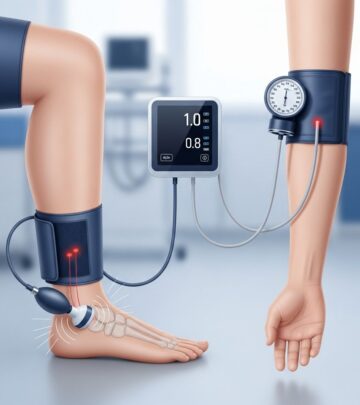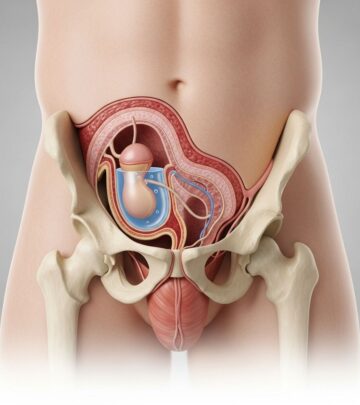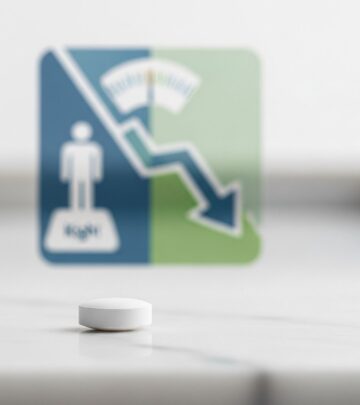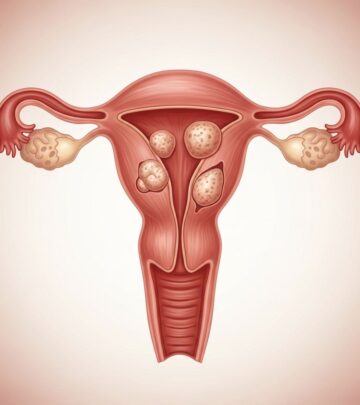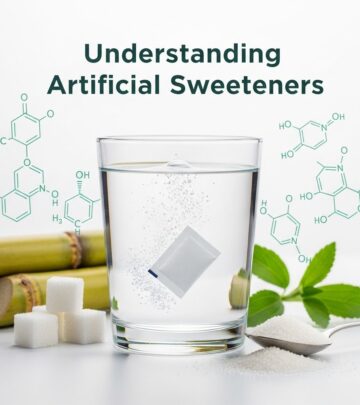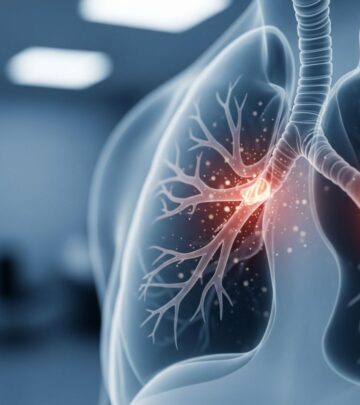Hiccups: Symptoms, Causes, and When to Seek Care
Learn the causes, symptoms, treatments, and warning signs of hiccups—and when persistent hiccups may signal a serious medical issue.

Hiccups are a common occurrence experienced by nearly everyone at some point. While most cases resolve quickly without intervention, hiccups can sometimes persist, signaling a more serious problem. This article reviews what hiccups are, their symptoms, causes, home remedies, diagnostic methods, treatment options, and when it’s essential to seek medical care. Learning the underlying factors can help you address hiccups appropriately and identify when professional attention is needed.
What Are Hiccups?
Hiccups, or singultus, are involuntary, repetitive contractions of the diaphragm—a dome-shaped muscle that separates the chest cavity from the abdominal cavity. Each contraction is followed by a sudden closure of the vocal cords, producing the characteristic “hic” sound.
While usually harmless and short-lived, hiccups can occasionally become persistent or severe.
Symptoms of Hiccups
- Involuntary Spasms: Sudden, uncontrollable contractions of the diaphragm.
- Sound: Audible “hic” noise caused by abrupt closure of vocal cords.
- Sensation: Some people experience tightness in the chest, throat, or abdominal area before each hiccup.
Hiccups usually resolve on their own within minutes, but persistent cases can last days, weeks, or even longer and may indicate an underlying health problem.
When to See a Doctor
- If hiccups last longer than 48 hours.
- If hiccups are severe enough to interfere with eating, sleeping, or breathing.
- If hiccups are accompanied by other symptoms, such as chest pain, severe abdominal pain, vomiting, fever, headache, confusion, or weakness.
Persistent or disruptive hiccups may suggest the presence of a medical condition that needs evaluation and treatment.
Common Causes and Triggers
Most hiccups result from everyday triggers and resolve rapidly. For cases lasting less than 48 hours, common causes include:
- Drinking carbonated beverages
- Drinking too much alcohol
- Overeating or eating very quickly
- Sudden emotional excitement or stress
- Experiencing rapid temperature changes, such as drinking a hot beverage then a cold one
- Swallowing air (from chewing gum or smoking)
Table: Common Short-Term Hiccup Triggers
| Trigger | Examples |
|---|---|
| Carbonated drinks | Soda, sparkling water |
| Alcohol | Beer, excessive consumption of any alcohol |
| Eating habits | Rapid eating; overeating |
| Emotional factors | Excitement, stress |
| Temperature changes | Sudden hot/cold drinks or foods |
| Swallowing air | Chewing gum, smoking |
Persistent or Long-term Hiccups (Lasting More Than 48 Hours)
Hiccups that last longer than 48 hours may be caused by underlying medical issues. The most common categories include:
Nerve Damage or Irritation
The diaphragm receives signals via the phrenic and vagus nerves. Damage or irritation to these nerves can result in persistent hiccups. Causes may involve:
- A foreign object (such as hair) or material in your ear in contact with the eardrum
- Tumors, cysts, or growths on the thyroid gland in the neck
- Stomach acid refluxing into the esophagus (gastroesophageal reflux disease, GERD)
- Sore throat or laryngitis
Central Nervous System Disorders
Issues affecting the brain or spinal cord can interfere with the body’s hiccup reflex. Examples include:
- Encephalitis (brain inflammation)
- Meningitis (inflammation of membranes around brain and spinal cord)
- Multiple sclerosis (demyelination of nerves in the brain or spinal cord)
- Stroke
- Serious brain injury or tumors
Metabolic Disorders
Metabolic problems disrupt the chemical balance inside the body and can include:
- Diabetes
- Electrolyte imbalances (e.g., abnormal potassium, sodium levels)
- Kidney disease
Certain Drugs and Alcohol
Medications or substance use can play a role:
- Sedatives or other anesthesia drugs
- Anti-inflammatory steroids, such as dexamethasone
- Alcohol dependence or use disorder
Rare and Unusual Causes
Although uncommon, other factors may contribute to long-lasting hiccups:
- Infections in the body impacting diaphragmatic control
- Cancer in proximity to the diaphragm or nerves
- Post-surgical complications affecting nerves
Complications of Persistent Hiccups
Long-term hiccups may disrupt daily life and lead to complications such as:
- Exhaustion and sleep disruption
- Weight loss or dehydration if eating/drinking are affected
- Discomfort and emotional distress
Diagnosis of Hiccups
If hiccups persist beyond 48 hours, a doctor may investigate to determine the underlying cause. Diagnostic approaches include:
Medical History and Physical Exam
Assessment focuses on potential triggers, duration, accompanying symptoms, and risk factors. A neurological exam checks for issues with reflexes, motor functions, and sensory abilities.
Laboratory Tests
- Blood tests can screen for metabolic or infectious causes, such as diabetes or kidney disease.
Imaging Tests
- Chest X-ray, CT, or MRI: To spot chest, brain, or diaphragm abnormalities or nerve damage involvement.
Endoscopic Examinations
- Endoscopy: A thin, flexible camera is guided down the throat to look for issues in the esophagus or trachea that may trigger hiccups.
How Are Hiccups Treated?
Most hiccups resolve on their own and require no treatment. If the cause is an underlying condition, treating that condition is critical. The following summarizes approaches used for persistent or severe hiccups:
Self-Care and Home Remedies
Although not always evidence-based, many home remedies are popular and safe for short-term relief:
- Hold your breath and swallow several times
- Drink cold water slowly
- Gargle with ice water
- Bite a lemon or taste vinegar
- Eat a spoonful of sugar or peanut butter
- Breath into a paper bag (avoid if you have breathing problems)
- Apply gentle pressure on your diaphragm by pulling your knees toward your chest
Other Reported Remedies (Mixed Evidence):
- Sudden fright or surprise
- Sneezing induced by black pepper
- Gently pulling on the tongue
- Drinking water from the far side of a glass
- Mild pressure or massage on specific pressure points, such as the soft palate or eyebrow area
Note: Home remedies should not replace medical attention if hiccups are long-lasting or cause distress.
Pharmacological Treatments
If hiccups persist beyond 48 hours and self-care is ineffective, physicians may prescribe medications:
- Baclofen: A muscle relaxant effective in some cases of persistent hiccups
- Chlorpromazine: Often used as a first-line medication for chronic hiccups
- Metoclopramide: A medication to aid digestion that can help control hiccups
Sometimes, gabapentin or other drugs may be considered, particularly for treatment-resistant cases.
Medical Procedures
If medication fails or is not suitable, advanced interventions may be necessary:
- Phrenic nerve block: Injection of local anesthetic to temporarily shut down the nerve controlling the diaphragm.
- Vagus nerve stimulation device: Surgical implantation of a small device that delivers mild electrical pulses to stimulate the vagus nerve, often used to treat epilepsy but sometimes effective for hiccups.
Prevention: Limiting Hiccups
Many hiccups are unavoidable, but some strategies can reduce the risk:
- Avoid overeating or drinking carbonated/alcoholic beverages quickly
- Manage stress and excitement with relaxation techniques
- Eat and drink slowly, in smaller amounts
- Avoid sudden changes in temperature of foods or drinks
Frequently Asked Questions (FAQs)
What causes hiccups to occur?
Hiccups occur due to involuntary contractions of the diaphragm, often triggered by stomach expansion (from overeating or drinking), sudden temperature changes, emotional excitement, or irritation of nerves involved in breathing.
Are hiccups ever dangerous?
While hiccups almost always resolve without harm, persistent (lasting more than two days) or severe hiccups may indicate a health problem requiring medical attention. Rarely, they signal disorders of the brain, nerves, or organs.
How can I stop hiccups quickly?
There’s no universally effective method. Simple actions like sipping cold water, holding your breath, or swallowing sugar may help stop hiccups, though scientific proof is limited.
When should I see a healthcare provider?
If hiccups last longer than 48 hours, disrupt daily activities, or are associated with other symptoms such as chest pain, vomiting, weakness, or confusion, see a doctor promptly for evaluation.
What treatments exist for chronic hiccups?
For chronic hiccups, medical treatments may include medications such as baclofen, chlorpromazine, or metoclopramide. Severe cases may require nerve blocks or a vagus nerve stimulation device.
Summary
Hiccups are common, brief spasms of the diaphragm, usually harmless and self-limited. Understanding typical triggers—such as overeating, alcohol, excitement, or temperature changes—can help manage and prevent hiccups. Persistent or severe hiccups may be a symptom of an underlying condition, and medical assessment is recommended when they last longer than 48 hours. Both home remedies and medical treatments are available, with advanced therapies reserved for difficult cases.
Read full bio of Sneha Tete

